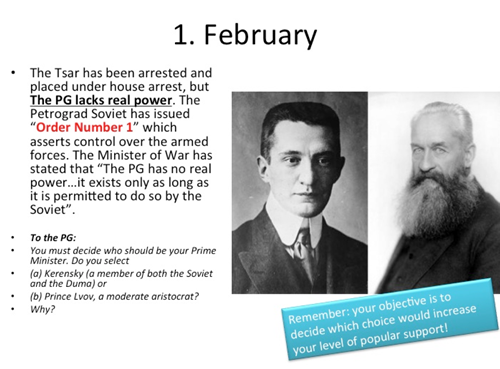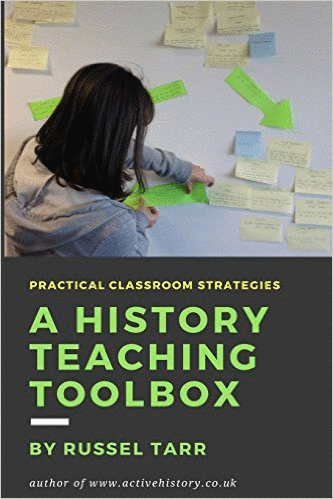Transform your history classroom
ActiveHistory provides educational, award-winning interactive simulations, decision-making games, self-marking quizzes, high-quality worksheets and detailed lesson plans for the school history classroom. All resources have been designed by full-time history teacher Russel Tarr.
An ActiveHistory subscription provides everything you need to construct and deliver a History course from start to finish for the entire 11-18 age range!
These consist not just of lesson plans, worksheets and teacher notes, but also multimedia lectures and interactive games and historical simulations ideal for remote learning and self-study.
World History teaching resources for the high school classroom: lesson plans, worksheets, quizzes and simulation games for KS3, IGCSE, IB and A-Level teachers.
"Analyse the significance of World War One for Russia"
The following unit is designed to provide IGCSE History students with a series of lessons which will enable them to answer the key question in the form of a 2000-word coursework essay. For much more detailed resources, you should consult the following additional pages:
Overview and study guide
During the Cold War, the debate about the nature and origins of the 1917 Communist Revolution was particularly heated. The Capitalist West was eager to discredit the origins of the USSR, and the USSR was equally determined to romanticise them.
Since the end of the Cold War, the debate has continued to rage between Left- and Right-Wing historians.
- On the Left, a defence of the Bolshevik revolution is important as a defence of socialism itself.
- On the Right, the demonization of the same event is central to discrediting socialist ideology.
The Coursework assignment: "Analyse the significance of World War One for Russia"
In this essay (2000 words maximum), we will consider to what extent the Russian Revolution and its legacy was the direct result of World War One. We will do this by considering each of the following questions in turn:
A. How stable was the Tsarist regime on the eve of World War One?
Politically, one of the major events that occurred in Russia during World War One was the overthrow of the Tsarist regime. Assessing the significance of World War One in this context requires us to consider whether the war CAUSED or merely ACCELERATED the collapse of the regime. Reaching a judgement on this issue requires us to determine how stable the regime was on the eve of the war.
1. How stable was the Tsarist regime on the eve of World War One? | Sources 1894-1905 | Sources 1906-1914
Teacher-led multimedia lecture
Complete with sources and video clips, this online lecture serves as a useful re-cap and consolidation of what has been learned so far.
Podcast: How stable was the Tsarist regime in Russia on the eve of World War One?
Student Worksheet | Teacher Notes | Quiz
A central part of the IGCSE coursework assignment ("How significant was World War One for Russia?").
B. What was the immediate political, military, and socio-economic significance of World War One upon Russia?
Regardless of whether the war was a cause or merely a catalyst for the February Revolution, it certainly had a significant immediate impact upon Russia. The issue which divides historians in this respect is explaining how military and socio-economic developments during the war were connected together.
Main task: What was the impact of World War One upon Russia up to February 1917?
There is also an extension activity focusing on the accuracy of the film "Rasputin", clips from which are incorporated into the main activity.
Video (above): What is AJP Taylor's typically quirky explanation of how the war contributed to the downfall of the Tsarist regime?
Podcast: How did World War One precipitate the Russian Revolution of February 1917?
Student Worksheet | Teacher Notes | Quiz
A central part of the IGCSE coursework assignment ("How significant was World War One for Russia?").
C. Was the October Revolution a coup d'etat or a popular uprising?
 The Provisional Government which took over from the Tsar in February 1917 remained committed to keeping Russia in the Great War. How significant this decision was in terms of contributing to the Provisional Government's overthrow by the Bolsheviks in 1917 is another subject of debate.
The Provisional Government which took over from the Tsar in February 1917 remained committed to keeping Russia in the Great War. How significant this decision was in terms of contributing to the Provisional Government's overthrow by the Bolsheviks in 1917 is another subject of debate.
Timeline Roleplay Exercise (interactive exercise using the Online ActiveHistory Presentation).
In this exercise, students are asked to start organising evidence under four headings: (a) Provisional Government mistakes/weaknesses; (b) Bolshevik mistakes/weaknesses; (c) Provisional Government strengths/successes; (d) Bolshevik strengths/successes.
The teacher will use this Online ActiveHistory Presentation to guide students through the key events between February and October. Each slide presents a fresh development, and students discuss and then vote on what they think the relevant party (Provisional Government or Bolsheviks) should do in order to increase their popularity. This is then compared to what really did happen so that students can then determine under which heading they should place their notes.
This is a highly effective and efficient way of getting students engaged with, and reflecting on, the key events in a step-by-step manner as a starting point.
Primary / Secondary Source Material
As the next phase of the investigation, students read through a series of selected primary and secondary accounts of the events of October 1917 and decide where each can be used, and which quotes are best to include. They should also be encouraged to reflect on the values and limitations of each of these sources.
Extension Materials for students
Historiography of October 1917 | Narrative overview February-October | Timeline of events February-October |
Podcast: How significant was World War One as a cause of the Russian Revolution of October 1917?
Student Worksheet | Teacher Notes | Quiz
This podcast episode covers a central part of the IGCSE coursework assignment ("How significant was World War One for Russia?").
D. How far can Stalin's rise to power be explained through reference to divisions in the party caused by WW1?
Assessing the impact of the war upon Russia also requires us to look to the long-term. In this sense, the first thing to consider is the immediate impact upon Russia of Lenin's decision to pull out of the war through the Treaty of Brest Litovsk.
The teacher will use this Online ActiveHistory Presentation to guide students through the key events and debates surrounding why Stalin was able to rise to power. There are several theories to explain why Stalin, who was a relatively anonymous figure at the time of the October Revolution, eventually became leader of the Soviet Union after the death of Lenin in 1924. These can be summarised as follows:
- Accidentalist: A series of chance events led to Stalin emerging as leader.
- Intentionalist: Stalin's strengths, and his opponents' mistakes, led to his rise.
- Marxist: Debates over economic policy led to Stalin taking power.
We will consider these various theories to help us answer the question "How significant was the experience and legacy of World War One as a factor in helping Stalin rise to power as leader of the Soviet Union?"
Podcast: How significant was World War One as a cause for Stalin's Rise to power?
Student Worksheet | Teacher Notes | Quiz
This podcast episode covers a central part of the IGCSE coursework assignment ("How significant was World War One for Russia?").
E. To what extent were Stalin's policies a direct attempt to protect Russia from the threat of another World War?
In the longer-term, the experience of World War One and the ensuing civil war which followed in its wake was used by Stalin to justify radical actions to protect the country against future threats. The teacher will use this Online ActiveHistory Presentation to cover the following themes:
- Stated objectives (WW1 as pretext) v. Real motives (WW1 as cause)
- When? (Did his motives change?)
- Long-term motives v. Short-term motives
- What? (Does it depend which policy you look at?)
- Different motives for policies like Industry, Agriculture, Politics, Military?
- Who? (does it depend on who you are looking at?)
- Different justifications offered to the party and to the people?
F. Historiography of the impact of WW1 upon Russia
As students move towards writing their final piece of coursework, this worksheet provides a comprehensive range of quotes from historians with different perspectives, along with guidance about how these can best be incorporated.
At this point, students are ready to write their coursework essay. This document - guidance for writing the coursework essay for students - outlines how to write an introduction, a conclusion, and provides a range of key words and phrases to help them analyse significance. It also makes use of the ClassTools "Essay Writing Bookmark" which I have made freely available for download here.

© 1998-2025 Russel Tarr, ActiveHistory.co.uk Limited (Reg. 6111680)
1 Torrin Drive, Shrewsbury, Shropshire, SY3 6AW, England
Privacy Policy | Contact







